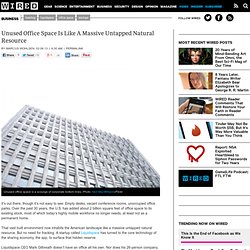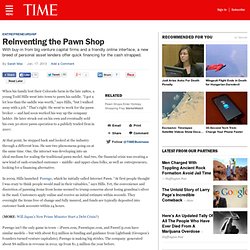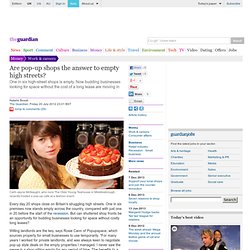

The Innovation That Could Make Most Job Interviews Obsolete. Unused Office Space Is Like A Massive Untapped Natural Resource. Unused office space is a scourge of corporate bottom lines.

Photo: Neil MacWilliams/Flickr It’s out there, though it’s not easy to see: Empty desks, vacant conference rooms, unoccupied office parks. Over the past 30 years, the U.S. has added about 2 billion square feet of office space to its existing stock, most of which today’s highly mobile workforce no longer needs, at least not as a permanent home. That vast built environment now inhabits the American landscape like a massive untapped natural resource. But no need for fracking. Liquidspace CEO Mark Gilbreath doesn’t have an office all his own. When I interviewed him via video chat, he was sitting at his desk in Ketchum, Idaho, where a picture window gave sweeping views of snowy mountains just over his shoulder. LiquidSpace may sound like little more than a version of Craigslist or AirBnb for offices.
But Liquidspace aspires to more than app-based classifieds. More than ever, that workplace is home or a table at Starbucks. Reinventing the Pawn Shop. When his family lost their Colorado farm in the late 1980s, a young Todd Hills went into town to pawn his saddle.

“I got a lot less than the saddle was worth,” says Hills, “but I walked away with a job.” That’s right: He went to work for the pawn broker — and had soon worked his way up the company ladder. He later struck out on his own and eventually sold his own 30-store pawn operation to a publicly traded firm in 2007. At that point, he stepped back and looked at the industry through a different lens. He saw two phenomena going on at the same time. In 2009, Hills launched Pawngo, which he initially called Internet Pawn. (MORE: Will Japan’s New Prime Minister Start a Debt Crisis?) Pawngo isn’t the only game in town – iPawn.com, Pawntique.com, and PawnUp.com have similar models – but with about $13 million in funding and guidance from Lightbank (Groupon’s founders turned venture capitalists), Pawngo is making big strides.
(MORE: 7 Ways Taxpayers Are Readying for the Fiscal Cliff) Are pop-up shops the answer to empty high streets? Carli-Jayne McNaught, who runs The Olde Young Teahouse in Middlesbrough, recently hosted a pop-up cafe at a fashion event.

Every day 20 shops close on Britain's struggling high streets. One in six premises now stands empty across the country, compared with just one in 20 before the start of the recession. But can shuttered shop fronts be an opportunity for budding businesses looking for space without costly long leases? Willing landlords are the key, says Rosie Cann of Popupspace, which sources property for small businesses to use temporarily. "For many years I worked for private landlords, and was always keen to negotiate pop-up style deals on the empty properties I managed. Pop-up shops go back to the early 2000s – US company Vacant claims it started experimenting in 2003 in New York after seeing consumers queue up to buy limited edition products on a business trip to Tokyo. Music promoter Henry Carden is one of the businesses to benefit from We Are Open.